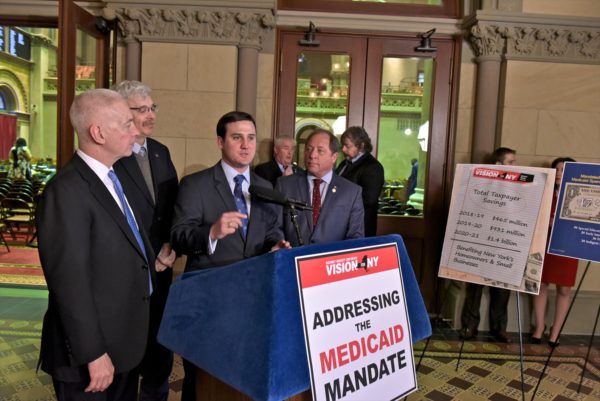Proposal would provide instant property tax relief for New Yorkers

Assemblyman Kevin Byrne (R,C,I,Ref-Mahopac) joined several of his Assembly Minority colleagues in calling for a state takeover of non-federal Medicaid costs at a press conference in Albany on Monday, March 12.
On Monday, March 12, Assemblyman Kevin Byrne (R,C,I,Ref-Mahopac) joined several of his Assembly Minority colleagues in calling for a state takeover of locally-mandated Medicaid costs. If enacted, this measure (A.9901) would immediately provide much-needed property tax relief for residents across the state, and would represent a major step forward in eliminating one of our localities’ most burdensome unfunded mandates.
This proposal would include a full state takeover of local Medicaid costs for counties outside of New York City over the next 10 years. In addition, 50 percent of New York City’s share would be absorbed by the state over a 20-year period. This measure would also result in an immediate reduction in property taxes. The legislation would also create a commission tasked with reforming public assistance benefits to protect the integrity of the program and prevent harm to beneficiaries from what is commonly referred to as the “benefits cliff.” This could allow beneficiaries to tier various Medicaid benefits, and empower beneficiaries to become more independent while less reliant on taxpayer funded programs.
“I feel strongly that our Conference’s proposed state absorption of non-federal Medicaid costs represents one of this year’s best opportunities to make the Medicaid program work better for its beneficiaries, while providing real meaningful tax relief to New Yorkers across the state,” said Byrne. “Unfunded mandates such as these require significant appropriations, crippling our local and county governments and causing property taxes to skyrocket. I urge my legislative colleagues to reaffirm their commitment to New York’s hardworking families, and join us in our efforts to address this pressing need.”
New York’s Medicaid program is the one of the most expensive programs in the nation, more than Texas and Florida combined. Currently, localities are responsible for $8.2 billion in mandated funding for this program each year, far and away the most of any state in the country.
